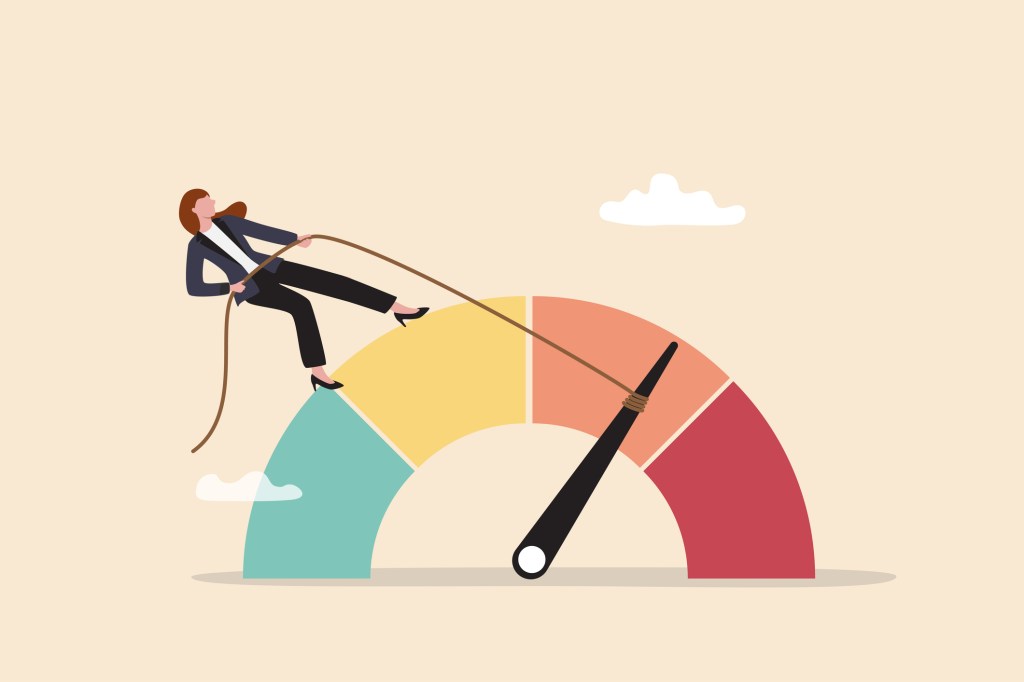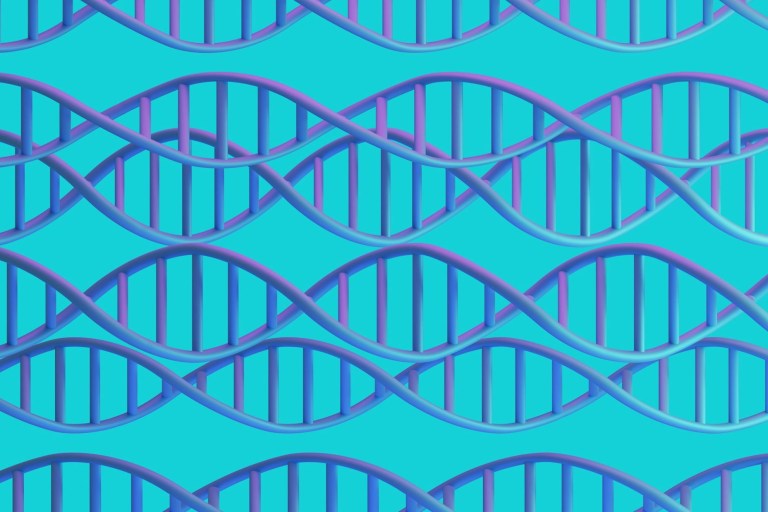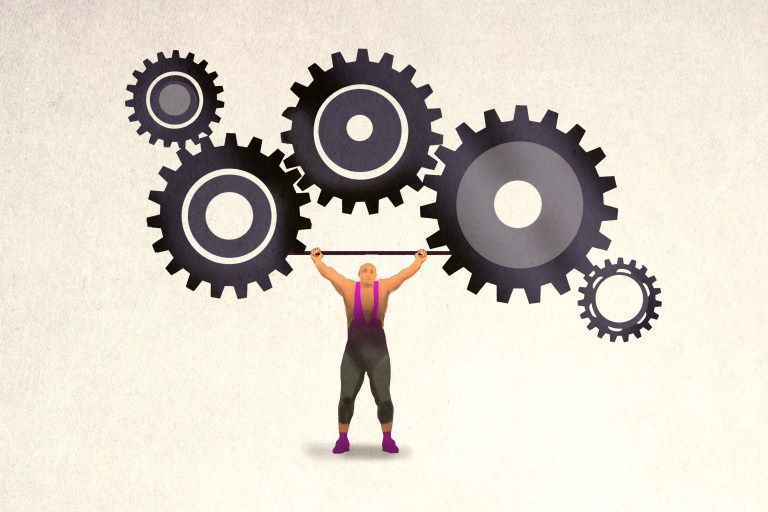Imagine that your wedding is coming up in a week, or that you’ve missed a deadline at work for the third time in a row. How would you feel? We’d bet that stress would be part of the equation, but we’d also imagine that the specific type and intensity of that stress would be quite different in each scenario.
The reason? Not all stress is created equal. Aside from the fact that getting married is (hopefully) way more fun than underperforming at work, different situations unlock distinct types of stress — and not all of them are bad for you. In fact, one variety can actually be beneficial (spoiler alert: It’s the type you’d feel before your wedding).
To help us unpack the different types of stress, we enlisted Daniel Kirsch, president of The American Institute of Stress, or AIS. “Although the word ‘stress’ originates from a Latin term meaning ‘distress,’ not all stress is harmful,” he shared with Nice News, adding, “I call stress the spice of life, for without it, life would be dull and boring and actually unlivable, because stress is the basic mechanism of human physiology and responsible for our mental and physical states in health and disease.”
Read on for more of Kirsch’s insights, including advice on how to handle stress in a healthy way.

Eustress
Eustress is the golden child of stress. It’s the kind that can have a positive impact, possibly even benefiting our health, according to a 2021 review. It’s triggered by moderate stressors, results in a mild response, and can help our bodies maintain equilibrium. Hans Selye, the founder of AIS, came up with the term by combining the words “euphoria” and “stress,” Kirsch pointed out.
Eustress can also help build resiliency by teaching us to recognize and eliminate what makes us anxious. “More and more researchers have come to realize that an optimal stress level is essential for building biological shields through hormesis to guarantee normal life processes,” the review authors wrote. Hormesis is that “adaptive sweet spot where the dose of stress is ‘just right,’” science reporter Christopher Bergland explained in a piece for Psychology Today.
It can be easy to confuse eustress for a “bad” type, since we may feel some not-so-nice symptoms, like a pounding heart. But as opposed to other kinds, it’s associated with positive outcomes like feelings of anticipation or excitement.

According to an upcoming AIS Certified Stress Coach course, “Eustress occurs when stress pushes us to step outside our comfort zones and tackle challenges, leading to personal growth and accomplishment. We experience eustress when challenges enhance our focus and performance, and when it adds excitement or variety to our lives. Successfully planning a wedding and pushing yourself hard and winning a race are two examples of activities that create eustress for some individuals.”
Another key attribute of eustress? It eventually comes to an end, with “a clear solution or a way out of the situation,” according to Medical News Today. While any stress presents challenges, this variety tends to feel more manageable — and when the wedding or race is over, its effects tend to fade.
Distress
When you think of stress, this is likely the first type that comes to mind. Distress is eustress’ evil twin, so to speak — it can last longer and may become overwhelming. “Distress is anything that negatively impacts you, whether emotionally or physically,” licensed clinical social worker Elizabeth Keohan told Talkspace. “While we can certainly feel distressed due to grief and loss, it could also be something as simple as a breakup or as impactful as a job loss or medical event. Often, the source is easy to identify, but it can also accumulate over time.”
From a scientific perspective, distress is caused by high levels of stressors that strongly challenge our body’s homeostasis. It may “induce a severe stress response, impair homeostasis, and endanger health,” according to the 2021 review, and might even lead to pathological conditions.

The physical effects of distress run the gamut: It can negatively impact appetite, memory, and judgment, as well as the immune, cardiovascular, gastrointestinal, and endocrine systems — and those are just the notes from one study.
But Kirsch emphasized that the specific impact stress has on the body varies widely. “The experience of stress — whether positive or negative — is deeply personal and varies from person to person,” he said. “For instance, while some find public speaking highly stressful, others enjoy it.”
Neustress
There’s a third type of stress that doesn’t fall in either of the previously mentioned buckets: neustress. The term dates as far back as 1979, when it was mentioned in Donald R. Morse’s Stress for Success: A Holistic Approach to Stress and its Management, the idea is that neustress is neutral — neither good nor bad — and that it helps our bodies maintain homeostasis.
However, the research on this variety is slim to nonexistent, and Kirsch said he doesn’t agree with the term’s definition: “Any stressor, no matter how insignificant, will cause a physiological cascade that varies based on the circumstances, the individual’s sensitivity to the stressor, past experiences, reactivity, coping mechanisms, and even genetics.”
How to Manage Stress
Now that we can differentiate between the two opposing ends of the stress spectrum, Kirsch offers an additional framework that can help us understand and manage each type: Instead of thinking of stress as good or bad, try parsing out if what you’re experiencing is acute or chronic.
The former triggers our fight-or-flight response and is caused by short-term stressors, while the latter is a result of long-term stressors, sometimes leading to physical and mental health conditions. Even eustress can be detrimental if it becomes chronic, Kirsch noted. “Too much good stress can kill you just as much as bad stress,” he said. “Your body doesn’t really differentiate.”
He advised first becoming aware of prolonged exposure to stressors, then taking steps to remove yourself from them, which is especially important as the smartphones many of us are glued to can serve up stressors at a near-constant pace. “I like to say that to charge your phone, you have to plug it in, but to charge your brain, you have to unplug it,” he said. “Our brains need frequent breaks.”
And don’t forget to pair this stress management mindset with complementary lifestyle choices. Meditation techniques (including deep breathing exercises), regular exercise (including yoga and basic stretching), eating well, and avoiding environmental stressors like pollution can all help, Kirsch explained.
To guide you through this process, AIS offers a variety of resources — including self-assessments that help you identify your specific triggers, a podcast with expert interviews, and stress management courses. Though Kirsch has been a pain and stress specialist for decades, he credits such courses with helping him discover one area he’d yet to master.
“I was surprised to learn that I had one uncontrolled stressor — perfectionism,” he said. “I didn’t think of that as a stressor, but rather a beneficial skill that allows me to excel as an author and editor. But when I thought about it, there was no doubt that [it] is truly my stressor. Now that I know that, although I still want my work to be perfect, I try to not let it affect me so much.”
When you buy books through our links, Nice News may earn a commission, which helps keep our content free.












